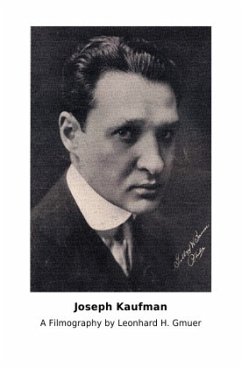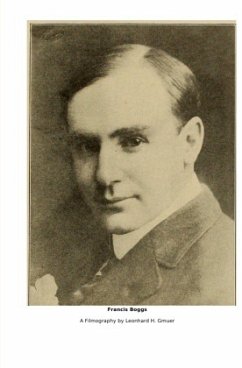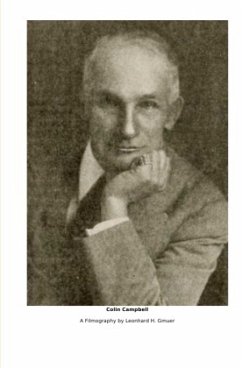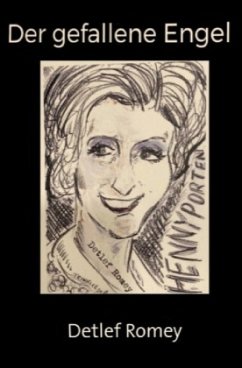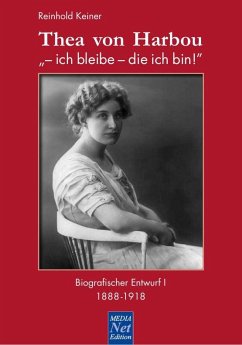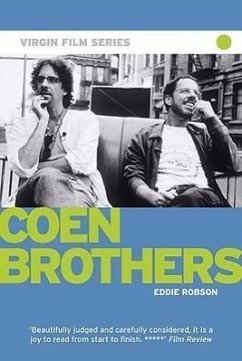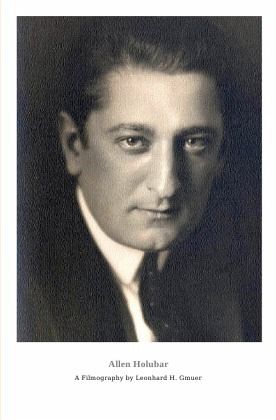
Allen Holubar
A Filmography
Versandkostenfrei!
Versandfertig in 6-10 Tagen
25,00 €
inkl. MwSt.

PAYBACK Punkte
0 °P sammeln!
He may have passed the peak of his career when sudden death ended the life of Allen Holubar in 1923 - Holubar was not even thirtyfive years old, when he passed away. He had directed at least thirty-four pictures in the years 1916 to 1923, among them seventeen full length features in the length of five thousand feet and more, and his greatest successes were five years away. He just had signed a three picture deal with the Metro Corporation and was directing the scenes of the Battle at Franklin in Tennessee, when he caught the typhoid fever, that was the cause of death of many soldiers forty yea...
He may have passed the peak of his career when sudden death ended the life of Allen Holubar in 1923 - Holubar was not even thirtyfive years old, when he passed away. He had directed at least thirty-four pictures in the years 1916 to 1923, among them seventeen full length features in the length of five thousand feet and more, and his greatest successes were five years away. He just had signed a three picture deal with the Metro Corporation and was directing the scenes of the Battle at Franklin in Tennessee, when he caught the typhoid fever, that was the cause of death of many soldiers forty years ago. He was Carl Laemmle's drawing card Number One when Universal expanded aggressively in the domestic US Film Market. But he broke up with Universal and Holubar became 'independent'.
He was married to actress Dorothy Phillips, his First Lady in most of his feature-length motion pictures. And Dorothy Phillips had her own career beside her husband's pictures, both were a prominent couple in the Hollywood comunity.
Holubar's name comes up in relation with other important events in Hollywood's Cinema at the end of the second decade: His and P.A. Powers influence re-opened Universal's doors to Rex Ingram in 1919; Holubar directed Rudolph Valentino in "Once to Every Woman," and he may have been given the decisive hints to cast Valentino for Ingram's "Four Horsemen of the Apocalypse."
Like other names in early Hollywood Cinema, Holubar's name disappeared with his death, his unfinished picture was never completed. Hw was not Hollywood's greatest director but he was well respected and successful in those years, and his moving pictures attracted crowds and experts. Or, with the words of Kevin Brownlow: In terms of cinematic action, Allen Holubar was probably better than Griffith...This annotated filmography is the first publication about this director, actor and producer to embrace his whole career from his early acting experiences to his last unfinished film.
He was married to actress Dorothy Phillips, his First Lady in most of his feature-length motion pictures. And Dorothy Phillips had her own career beside her husband's pictures, both were a prominent couple in the Hollywood comunity.
Holubar's name comes up in relation with other important events in Hollywood's Cinema at the end of the second decade: His and P.A. Powers influence re-opened Universal's doors to Rex Ingram in 1919; Holubar directed Rudolph Valentino in "Once to Every Woman," and he may have been given the decisive hints to cast Valentino for Ingram's "Four Horsemen of the Apocalypse."
Like other names in early Hollywood Cinema, Holubar's name disappeared with his death, his unfinished picture was never completed. Hw was not Hollywood's greatest director but he was well respected and successful in those years, and his moving pictures attracted crowds and experts. Or, with the words of Kevin Brownlow: In terms of cinematic action, Allen Holubar was probably better than Griffith...This annotated filmography is the first publication about this director, actor and producer to embrace his whole career from his early acting experiences to his last unfinished film.



